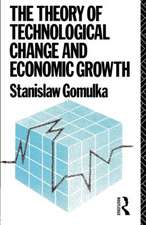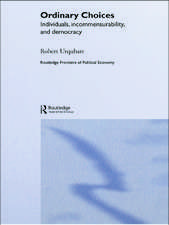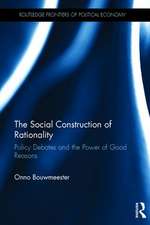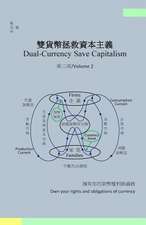The European Union and Supranational Political Economy: Routledge Frontiers of Political Economy
Editat de Riccardo Fiorentini, Guido Montanien Limba Engleză Paperback – 11 noi 2016
The global financial turmoil shook deep-rooted beliefs. The doctrine of international neo-liberalism is more and more criticized. Nevertheless, the critics of neo-liberalism focus their attention on the relationship between the state and the market, as if the nation states, with their international organisations, have enough power for an effective global governance of the world economy. The model of European supranational integration, though seriously imperfect, can suggest some new way out from the crisis – even at the world level – based on a new relationship between the supranational government of the Union and the market.
In this book, several academic disciplines are involved: international economics, international political economy, international law, international relations, political theory and democratic theory. Adopting such a multidisciplinary theoretical perspective, the volume tries to answer the following question: Is a more supranational Europe able to provide a better government of the EMU? Does this reform involve more European democracy?
| Toate formatele și edițiile | Preț | Express |
|---|---|---|
| Paperback (1) | 322.97 lei 6-8 săpt. | |
| Taylor & Francis – 11 noi 2016 | 322.97 lei 6-8 săpt. | |
| Hardback (1) | 705.50 lei 6-8 săpt. | |
| Taylor & Francis – 9 dec 2014 | 705.50 lei 6-8 săpt. |
Din seria Routledge Frontiers of Political Economy
-
 Preț: 309.90 lei
Preț: 309.90 lei -
 Preț: 309.79 lei
Preț: 309.79 lei -
 Preț: 316.03 lei
Preț: 316.03 lei -
 Preț: 310.95 lei
Preț: 310.95 lei - 9%
 Preț: 866.82 lei
Preț: 866.82 lei -
 Preț: 309.12 lei
Preț: 309.12 lei -
 Preț: 311.61 lei
Preț: 311.61 lei -
 Preț: 286.99 lei
Preț: 286.99 lei -
 Preț: 327.83 lei
Preț: 327.83 lei -
 Preț: 311.87 lei
Preț: 311.87 lei -
 Preț: 302.76 lei
Preț: 302.76 lei - 9%
 Preț: 938.48 lei
Preț: 938.48 lei -
 Preț: 152.67 lei
Preț: 152.67 lei -
 Preț: 151.97 lei
Preț: 151.97 lei -
 Preț: 318.54 lei
Preț: 318.54 lei -
 Preț: 317.95 lei
Preț: 317.95 lei -
 Preț: 310.01 lei
Preț: 310.01 lei -
 Preț: 326.49 lei
Preț: 326.49 lei -
 Preț: 155.44 lei
Preț: 155.44 lei -
 Preț: 309.79 lei
Preț: 309.79 lei -
 Preț: 328.76 lei
Preț: 328.76 lei -
 Preț: 281.72 lei
Preț: 281.72 lei -
 Preț: 286.58 lei
Preț: 286.58 lei -
 Preț: 386.12 lei
Preț: 386.12 lei -
 Preț: 353.78 lei
Preț: 353.78 lei -
 Preț: 325.09 lei
Preț: 325.09 lei -
 Preț: 310.55 lei
Preț: 310.55 lei -
 Preț: 387.03 lei
Preț: 387.03 lei -
 Preț: 324.87 lei
Preț: 324.87 lei -
 Preț: 312.86 lei
Preț: 312.86 lei -
 Preț: 374.16 lei
Preț: 374.16 lei -
 Preț: 329.09 lei
Preț: 329.09 lei -
 Preț: 348.22 lei
Preț: 348.22 lei - 28%
 Preț: 1047.06 lei
Preț: 1047.06 lei - 18%
 Preț: 1169.45 lei
Preț: 1169.45 lei - 18%
 Preț: 1555.17 lei
Preț: 1555.17 lei - 18%
 Preț: 1048.43 lei
Preț: 1048.43 lei - 18%
 Preț: 1059.84 lei
Preț: 1059.84 lei - 31%
 Preț: 767.47 lei
Preț: 767.47 lei - 18%
 Preț: 731.92 lei
Preț: 731.92 lei - 28%
 Preț: 822.54 lei
Preț: 822.54 lei - 18%
 Preț: 1796.21 lei
Preț: 1796.21 lei - 29%
 Preț: 1184.91 lei
Preț: 1184.91 lei - 18%
 Preț: 1120.23 lei
Preț: 1120.23 lei - 15%
 Preț: 700.95 lei
Preț: 700.95 lei - 18%
 Preț: 1116.31 lei
Preț: 1116.31 lei - 25%
 Preț: 299.52 lei
Preț: 299.52 lei
Preț: 322.97 lei
Nou
Puncte Express: 484
Preț estimativ în valută:
61.81€ • 67.11$ • 51.92£
61.81€ • 67.11$ • 51.92£
Carte tipărită la comandă
Livrare economică 22 aprilie-06 mai
Preluare comenzi: 021 569.72.76
Specificații
ISBN-13: 9781138226845
ISBN-10: 113822684X
Pagini: 320
Ilustrații: 8
Dimensiuni: 156 x 234 mm
Greutate: 0.45 kg
Ediția:1
Editura: Taylor & Francis
Colecția Routledge
Seria Routledge Frontiers of Political Economy
Locul publicării:Oxford, United Kingdom
ISBN-10: 113822684X
Pagini: 320
Ilustrații: 8
Dimensiuni: 156 x 234 mm
Greutate: 0.45 kg
Ediția:1
Editura: Taylor & Francis
Colecția Routledge
Seria Routledge Frontiers of Political Economy
Locul publicării:Oxford, United Kingdom
Public țintă
Postgraduate and UndergraduateCuprins
Part I: Birth of the supranational project 1. The Birth of the European Community: Supranational Ideals and National Interests Daniela Preda 2. European Integration: Contrasting Models and Perspectives Fabio Masini Part II: Europe between confederalism and federalism 3. Confederalism as a solution for Europe John McCormick 4. Beyond the ‘ever closer union’ – national interests, institutional power shifts, and threats to the ‘permissive consensus’ in Germany Roland Sturm 5. The neo-liberal defeat of European integration and the need for a supranational political economy Zoltán Pogátsa 6. Can the EU be democratised? A political economy analysis. Heikki Patomäki 7. Res Publica Europaea: A Citizens-Based Concept To Re-Think Political Integration of Europe Ulrike Guérot Part III: Policy issues 8 Analysis and measurement of the state of integration and supranational prospects in the EU Tibor Palankai 9. From an ‘austere’ monetary union to a federal union: more solidarity among European citizens Riccardo Fiorentini 10. Game changer? The transformation of global gas markets and the future of the EU-Russia energy relationship Richard Connolly Part IV: Political economy: from internationalism to supranationalism 11. Neo-liberalism, federalism and supranational political economy.Guido Montani 12. Dollars, euros, and debt in the American and European Monetary Unions Vito Tanzi 13. Against EUrocentrism: a new stage in the building of the European Republic Fernando Iglesias
Notă biografică
Riccardo Fiorentini, Guido Montani
Descriere
In this book, several academic disciplines are involved: international economics, international political economy, international law, international relations, political theory and democratic theory. Adopting such a multidisciplinary theoretical perspective, the volume tries to answer the following question: Is a more supranational Europe able to provide a better government of the EMU? Does this reform involve more European democracy?
























